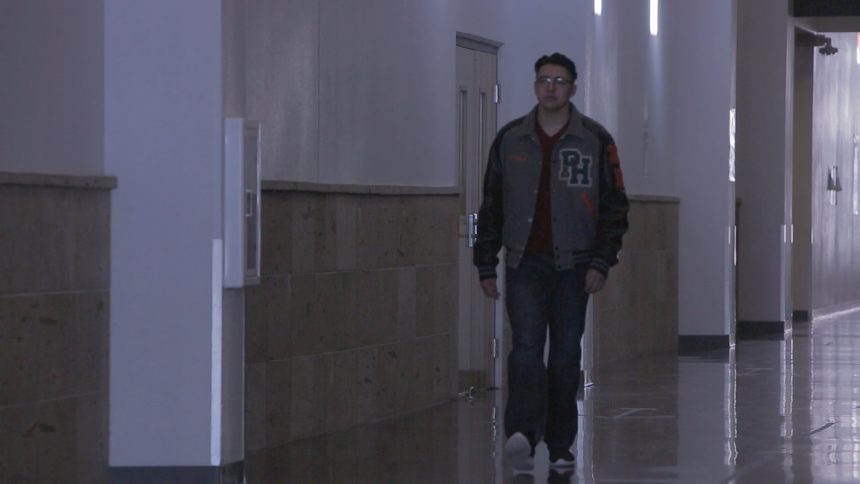Fight for sight: Experimental drug secured overseas for El Paso student’s rare eye condition

EL PASO, Texas (KVIA) -- The week before district wrestling championships, Gustavo Renteria Jr. is ready for a challenge. Training has not always been easy. In December 2019, he faced a challenge greater than any opponent.
"My coach had told me which mat to go to and then I looked and I didn't know," the Pebble Hills High School junior said. "I couldn't tell the mats apart from the colors."
Renteria, known as Gus to his family and friends, was going blind.
"I could still see things, but my vision was blurry," he said. "It's like a foggy mirror. I just thought, 'Oh, I just need new glasses.'"
Glasses would not fix the problem.
"There was a lot of fear," Gus said. "I thought that my eyesight would get worse and worse until eventually I wouldn't see anything and things would go dark."
A doctor sent Gus to the emergency room. That's where Dr. Claudia Maria Prospero Ponce, a neuro-ophthalmologist with Texas Tech Physicians of El Paso diagnosed him with Leber hereditary optic neuropathy (LHON).
"I have not seen one in El Paso," said Dr. Prospero Ponce. "It's a rare disease."
"I was devastated, shocked," said Gus's mom, Wendy Renteria. "We were all shocked."
"You have plans for your kids, right? You talk to them and they tell you what they want to do. And when stuff like that happens… A question mark," said Gus's dad, Gustavo Renteria Sr.
The disease is genetic. Two of Gus's relatives already had it. There's no FDA-approved treatment and really no cure.
Meanwhile, Gus's vision was getting worse.
"I felt that I was gonna keep fighting it and not going to give up and just to push through and improve my eyes," Gus said. "The best that I could."
Gus took supplements. He memorized where his classrooms were and used a bigger screen to study. His iPhone became a magnifying glass to zoom in on textbooks.
Dr. Prospero Ponce and the Renterias kept searching for a way to save Gus's sight.
"We wanted to make sure that there was no stone unturned," Gustavo Renteria Sr. said.
The Renterias also turned to prayer.
"We've gotten closer as a family," Wendy Renteria said. "It's taught us to be there for one another and just to have faith."
Four months later: those prayers were answered. Gus's dad and Dr. Prospero Ponce found out about experimental drug in France. Trials for the GenSight medication showed promising results but the company was still waiting for FDA approval.
"No medication that is FDA not approved is given easily," Dr. Prospero Ponce said.
Sometimes the FDA allows companies to provide experimental drugs outside of trial settings for what is called "compassionate use." The company would have to agree and the FDA would have to sign off.
"I said, this is something that I want to do for my patient," Dr. Prospero Ponce said. "I cannot imagine someone not having vision. If I have the knowledge to help them in a devastating genetic mutation they have because they're going to go blind, this is what I signed for."
Another complication: Gus is a minor.
"You must really say why, because it is risky, right?" Dr. Prospero Ponce said. "'Hey, Dr. Prospero, why are you injecting DNA mutations in the eye of a patient that is a kid?'"
After months of work by Gus's team at Texas Tech Physicians of El Paso and Texas Tech University Health Sciences Center El Paso, Gus was approved for the treatment. He was given the medication free of charge.
Last fall, Gus received an injection of the medication in each eye.
"As the months go by, my eyes get better and better," Gus said. "I'm able to start driving, practicing again. I can read bigger print books."
"Gus has had to grow up really fast," said Carlos Paniagua, Gus's wrestling coach. "He has always known he was losing sight, but he had a vision in mind of what he was going to get accomplished and he's getting there."
"He doesn't give up, which I'm proud of," Wendy Renteria said. "He's looking forward to his future."
Dr. Prospero Ponce and the Renterias do not know if Gus will ultimately require more treatment. But his case means there is hope for others in the Borderland who might have LHON or undiagnosed vision loss.
Now Gus is finishing his junior year of high school at Pebble Hills High School. He's thinking about college and joining the Border Patrol.
Gus won first place in district championships, then second at regionals. He ultimately competed in the state championship.
"It's taught me to really enjoy the little things," Gus said. "I felt like if I just kept pushing on, then it's just going to result in a better life. And that it was up to me to make the most of what I have."
